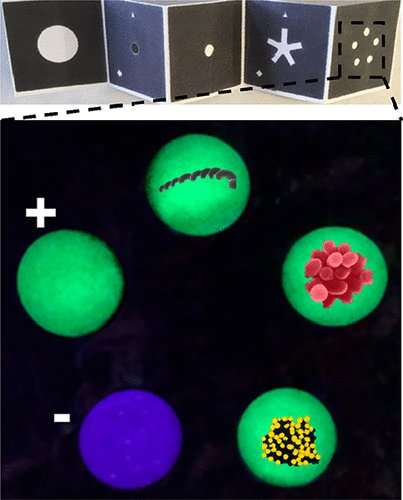'Origami' diagnostics breakthrough set to benefit developing-world farmers

Sheets of folded paper, printed with wax, could be the key to developing very low cost diagnostics to improve the health of livestock in in low- to middle-income countries.
In a paper published in the journal ACS Sensors, biomedical engineers, veterinary scientists and bacteriologists from the UK and India describe how disposable diagnostic technology that uses paper folding, akin to origami, to process complex biochemical tests has helped farmers in India identify three separate reproductive infections in cattle.
The new technique provides a new method for identifying Brucella, Leptospira and bovine herpes virus-1 infections, which are particularly prevalent in India, along with many other countries in Asia, Africa and South America. All three infections can affect livestock's reproductive organs, reducing fertility and resulting in loss of milk production, with a significant impact on agricultural output.
However, reproductive infections are difficult for farmers to diagnose through simple observation during the early stages, meaning infection can spread quickly during breeding season. Once infected cattle are identified, they must be destroyed, leading to disruptions in milk supply and incurring significant costs for farmers.
While there are molecular diagnostics tests currently available for these infections, they are time-consuming, expensive and require skilled technicians to administer them, meaning the tests cannot be undertaken in areas far from specialised facilities.
The new diagnostic technology, developed by researchers from the University of Glasgow uses a commercially-available printer, which coats the paper in patterns made from water-resistant wax. When the paper is folded – like in origami—the sample fluid is directed into channels in the pattern.
The folded-paper device enables the DNA of the pathogens to be detected, thus providing the ability to diagnose infections. The technology was tested during two field trips to Izzatnagar in India, where the diseases have a particularly high prevalence.
Dr. Zhugen Yang, biomedical engineering research fellow at the University of Glasgow, is the paper's lead author and undertook the trips to India. Dr. Yang said: "These folded pieces of wax-printed paper, which can be made using a standard printer, may look simple, but the unique properties of folded paper give us a highly reproducible method to capture samples and prepare them for testing.
"The tests we conducted on farms and showed excellent results which were as good as similar reproductive disease tests conducted in laboratory conditions. It's a very encouraging result which shows future promise for veterinary medicine."
Professor Jonathan Cooper, the University of Glasgow's Wolfson Chair of Bioengineering, added: "Being able to quickly and affordably identify the most common reproductive diseases in cattle could help support agriculture in low- to middle-income countries. It could be of particular benefit in India, which is now the world's largest dairy producer, contributing around 125 billion litres each year. We're very pleased with these results, and keen to move forward in making this technology available for vets and farmers in Asia, Africa and South America."
The paper, titled "Rapid Veterinary Diagnosis of Bovine Reproductive Infectious Diseases from Semen using Paper-Origami DNA Microfluidics," is published in the journal ACS Sensors.
More information: Zhugen Yang et al. Rapid Veterinary Diagnosis of Bovine Reproductive Infectious Diseases from Semen Using Paper-Origami DNA Microfluidics, ACS Sensors (2018). DOI: 10.1021/acssensors.7b00825
Journal information: ACS Sensors
Provided by University of Glasgow
















